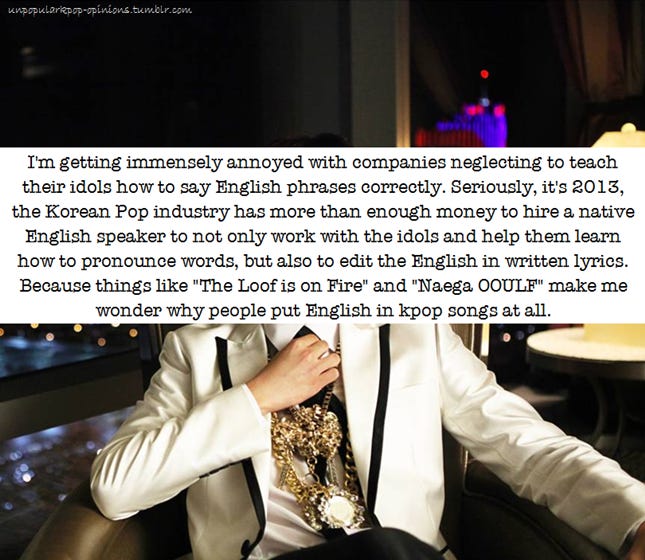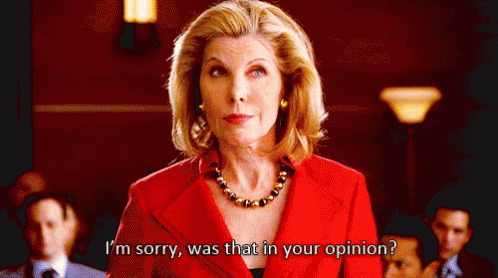Why Can't K-pop Groups Speak English Better?
The better question is: Why are they expected to?
Let me start this post by saying that I’m pleased that non Koreans like K-pop. When I was growing up in Chicago, few people knew that Korea even existed as a country. None of my American friends were interested in Korean music and they certainly didn’t idolize any Korean stars.
So, that being said …
I was thinking about a post from 2013 going around again on social media about Korean musicians and their inability to speak English perfectly.
Pleonasmism does a good job of breaking it down here:
I think it’s really telling that the people whining about the English in K-Pop are conflating “professional" standards with non-Korean English. There’s also an assumption here that accents from countries like the U.S. and England qualify as “correct" native pronunciation against which other accents can be judged. Apparently, pronunciation from places like India, HK, Thailand, Singapore and the Philippines, many of which are geographically closer to South Korea, are somehow inferior and unprofessional.
It’s also disturbing to see people hiding behind the “It’s my opinion" excuse. An opinion is not a magic cure-all. You can stick “It’s my opinion that" in front of just about anything: It’s my opinion that the moon is made of cheese. It’s my opinion that air is poisonous to dogs. It doesn’t make it accurate or well-evidenced. It doesn’t make criticism invalid. Opinions can be wrong.
And it certainly doesn’t make the latent imperialism of the OP “okay."
The standard for “correct" English pronunciation is not centered in the West.
Edit: Are there really people comparing their trips to Europe with the power dynamics of English, a language spread throughout the world with military bloodshed and cultural imperialism? Really?
But one of the commenters wrote this:
"I wouldn’t dare go to sing in another country unless I could pronounce their language to basic standards. That’s me though. I really wish people would stop jumping on each other and try to understand with someone’s opinion. It’s okay to disagree. That’s why it’s an opinion."
Where to begin?
First, this is like me saying, “I just know that if I was a famous supermodel, I’d look a lot better than the girls featured in Vogue." Right. Because the likelihood of me actually ever becoming a supermodel is a big ol’ ZERO.
Second, what’s the probability that the person who made that hollow comment will ever become a professional musician, much less one who needs to learn another language before going to that country to sing in that country’s official language? Does Beyonce need to sing in Korean when performing in Seoul? So should Green Day sing in Mandarin performing in China? Did Paul McCartney sing in Japanese while performing in Tokyo?
Do you know how you become fluent in a foreign language without a trace of your native accent? Sure, there are exceptions to any rule, but the most efficient way is to move to the country where the language you want to learn is spoken and immerse yourself by speaking it every day, surrounded by the accent you want to emulate. For instance, I speak perfect American English. Why? Because I’ve lived in the U.S. since I was a youngster.
My mother has lived in the U.S. the same length of time as I have. However, she doesn’t speak “perfect" English. She has an accent. Why? Because she came to the U.S. as an adult. Learning a new language and acquiring that native accent is best accomplished as an adolescent.
Research shows that accent becomes ‘fixed’ between 9 and 11 years of age. If a typical child migrates before this age, their English will likely show no influence of their original accent. They will learn to speak with the English accent spoken by the kids and teachers around them. —ClearSpeak
So, in order for these K-pop stars to speak English in a way that would please some of their fans better, there would have to be a lot of things going on. A manager would have to handpick these children when they are super young on the off chance that they would grow up to have what it takes to become a K-pop star. Their parents would need to send them away to a foreign land so that they lose their Korean accent. They would have to return to Korea to train in singing, dancing and acting, and try not to lose the American/English/Australian etc. accent they’ve acquired living abroad. And, they would have to be one of the few who have the combination of looks, talent and luck to be chosen to perform in one of these groups.
K-pop groups are doing their part to cater to English speakers by including Korean Americans and other Korean diaspora who are bilingual. As far as I’m concerned, that’s more than enough.
And, finally, if you want to listen to people who speak English well (regardless of accents, grammar or pronunciation), don’t expect to get it from bands. Music isn’t the forum to hear perfect English, not even by American or British bands.
Don’t believe me? Go listen to just about any song in English and then try diagramming their sentences.
Proof.
What I’m listening to:
• D-Day by Suga. Album is very good, especially “Snooze,” which features Woosung from The Rose and the late Ryuichi Sakamoto.
Highly Recommended:
• Queenmaker: The finale of this female-led revenge series hints at a Season 2 and I’m all for it!
• Divorce Attorney Shin: Quirky and a bit weird (in a good way), this K-drama touches on so many relevant issues.
• Jinny’s Kitchen: This food reality series set in Mexico is so soothing.
What I’m Watching:
• XO, Kitty: I’m watching screeners of this Netflix series, which drops on May 18.
• The Real Has Come: Interesting concept, but I forgot about it while waiting for new episodes to drop.
Struggling to Finish:
• Somebody: It’s a thriller that definitely deserves its MA rating. I have two episodes left to watch and have little interest in seeing how it ends.
• Heavenly Idol: I’m 6.5 episodes in and think it’s cute, but not particularly interesting so far.
© 2023 JAE-HA KIM | All Rights Reserved






Oh, boy. You hit a nerve! It is so bad on Weverse Live with "fans", that I almost can't watch them anymore, English subs or not. Even the BTS members are starting to turn off the comments. The arrogance and/or immaturity of some fans demanding that BTS speak English is disgusting. It's not just some fans, either. The US media and music industry is just as guilty. Did Queen learn Korean, Japanese or Portuguese when they went to Asia & S. America? NO. They sold out around the world because music transcends language! I'm ARMY. I'm trying to learn Korean, but at 68 it's not so easy. The thing is I can SING phonetically in Korean (to BTS only!) and I know what I am singing about because I have listened to their songs thousands of times and I use the GD subtitles, when I need to. I am so addicted to subtitles that I sometimes use them on English language shows! I can identify who is speaking (from BTS) just from the tone and cadence of their speech. I find Kim Taehyung's English endearing. They all TRY and truth be told I would rather hear them speak in Korean and wait for subs because it is so much more natural for them and the emotion of what they are saying comes through so clearly. I also find the Korean language to be almost melodic and logical. I realize that a segment of the US population EXPECTS English to be spoken everywhere and is oblivious to the fact that in many parts of the world (and in Native American communities) being forced to speak English has historically negative connotations. Probably the same demographic that is having a hissy fit over the Bud Lite issue. I'll be long gone, but one day this behavior will be looked at with the same abhorrence with which we view Jim Crow laws, internment camps, etc. I hope.
Artists tour all over the world and only learn a few lines by heart to say during their shows. Nobody's obligated to know English, period.
It's also annoying when so-called fans join idols lives and keep telling them to speak English. They're not puppies to play tricks, and if they're not fluent in English, good for them! I personally chose to listen to Korean music and now I'm learning the language just like I learned English. It's not easy but it is simple.